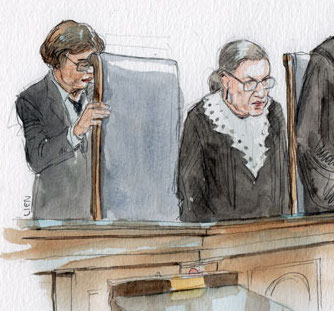She lights our way

on Sep 25, 2020 at 3:02 pm

This tribute is part of a series on the life and work of the late Justice Ruth Bader Ginsburg.
Parker Rider-Longmaid clerked for Ginsburg during the 2016-17 term. He is now an appellate attorney at Jones Day in Washington, D.C. All views are his own.
What will I teach my son about Justice Ginsburg?
She was a patriot. She believed that the Constitution promises to protect and promote our individual liberties and talents, and that We the People means All the People. For her, the law was not an abstraction. All of us have value, she believed; all of us, something to contribute. Her vision drew on her kindness and concern for people — family, clients, colleagues, law clerks, litigants, and countless Americans yearning for inspiration. In her time on the bench, Justice Ginsburg voted to set women and men, gay and straight, transgender and cisgender, and black, white, and brown people on equal footing. She voted to protect our Fourth Amendment rights against pervasive government surveillance; to stop the execution of individuals with intellectual disabilities; to protect women’s right to choose; to guarantee voting rights; and to give juvenile offenders a chance at redemption.
Justice Ginsburg lifted the torch to guide us toward greater equality long before her time on the bench. In the Supreme Court’s landmark decision in Obergefell v. Hodges recognizing the constitutional right to same-sex marriage, Justice Anthony Kennedy wrote that “[t]he nature of injustice is that we may not always see it in our own times.” But Justice Ginsburg saw it. She lived it. In a world defined by paralyzing gender norms, she was demoted for being pregnant. At Harvard Law School, she was forced to explain why she had taken a man’s spot. After she graduated from Columbia Law School, where she had transferred to be with her husband, Marty, she couldn’t get a job at a law firm in New York City despite her exemplary, top-of-class performance.
But Justice Ginsburg pressed on. In a series of cases, she showed the Supreme Court — then composed, as it always had been, only of men — that the Constitution’s equal protection guarantee prohibits discrimination on the basis of sex; that men and women should not be defined by their gender at birth; and that mothers and fathers could be equal parents in the eyes of the law. She became, in the finest sense, a teacher. She taught Americans far and wide that stereotypes written into our government codes constrain both individual opportunity and our society’s achievement of its full potential.
And how far we have come along the path she marked. When Justice Ginsburg began her career as an advocate, “the lawbooks of our Nation were rife with overbroad generalizations about the way men and women are” (as she herself wrote in her majority opinion in Sessions v. Morales-Santana). Women had never served on the Supreme Court and were not welcome at the Virginia Military Institute; it was a crime to be gay; and a child growing up in a body of the wrong sex found precious little protection, if any, under the law. Years later, Justice Ginsburg traveled to the Virginia Military Institute to hear from and celebrate a class of female cadets proud to serve their country. Four women have now guided us on the Supreme Court. Today, same-sex couples have the constitutional right to marry, plus federal civil rights against discrimination in the workplace. And federal law — as a federal appeals court decided just last month — guarantees to transgender students the right to use bathrooms matching their gender identity. Today our lawbooks don’t just recognize that we are different. They respect, protect, and celebrate those differences. Thanks to Justice Ginsburg’s unflagging guidance, untold millions of Americans, and generations not yet born, can know greater freedom in a Nation bending ever closer to justice.
Justice Ginsburg’s death is so devastating not just because we loved her, but because we know that we still have so far to go to achieve the just world she envisioned. Today we face forces that would suppress the vote, take away a woman’s right to choose, arrest peaceful protestors, carve exemptions into civil rights laws protecting our most vulnerable, and shield police officers who gun down Americans because they do not believe Black lives matter. Justice Ginsburg would have wanted us to rededicate ourselves to the unfinished work remaining before us, one small step at a time. She believed that together we are not just the beneficiaries but also the guardians of the Constitution’s guarantees. She would remind us that what we do outside ourselves, in law as in life, matters.
Much has been said about the distress Justice Ginsburg must have experienced about what will come next in our politics. But as the justice would remind us, the emblem of America could be the pendulum: There is in democracy the risk of leaning too much to one side or the other, but it always self-corrects over the long run. She could say that because of the faith she had in us to continue to strive for equal justice in our lifetimes and those of our children. The pendulum will swing back — so long, she would say, as we have the steadfast commitment to see the task through to completion.
My three-year-old son won’t get to know Justice Ginsburg. But he will walk alongside people in whom her memory and example live on, in a world that will never be the same because of what she did to redefine it. I hope she will inspire him just as much as she continues to inspire me.


